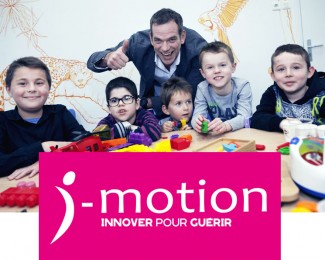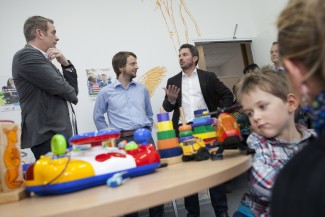I-Motion is a new pediatric center for neuromuscular diseases which studies innovative biotherapies and is unique in Europe.

The famous Canadian artist Garou, mentor of the Téléthon 2014 and mentor of I-Motion (Institute of Muscle-Oriented Translational Innovation.) came last Wednesday November 18th to launch it and meet with young patients, parents and healthcare professionals. Created last June 2015 by AFM-Telethon and the Association for the Myology Institute, in partnership with the AP-HP (Paris Public Hospitals Group) and the scientific University Pierre & Marie Curie, this clinical research institute is unique in Europe. It aims at making easier the implementation of international pediatric clinical trials sponsored by industrial, academic or internal partners. It also aims at carrying out neuromuscular translational programs supported by the Myology Institute and contributing to myobanks.
Located at the heart of the Trousseau hospital in Paris (France), the I-Motion institute offers many assets. As an integrated services hub, it includes a medical consultation in the neuromuscular field complementary to the research activity. The welcome service is of high quality and multilingual. A full cross-disciplinary medical expertise is offered in order to optimize the care coordination and therapeutic effectiveness (cardiology, neurology, nephrology, radiology, pharmacists, kinesitherapy, etc…). Quality of life for young patients and their family coming from all over Europe is also made easier thanks to hotel facilities across the road.

Project managers are Laurent Servais – Neuropediatrician and head of the clinical trials at the Institute of Myology – and Raphaël Vialle – head of the corrective and orthopedic surgery department at the Trousseau hospital. They both explained that studies conducted by I-Motion include gene therapy and cell therapy approaches (via the Biotherapies Institute for Rare Diseases), pharmacological ones, observational ones, etc… As a conclusion, they mention that 120 patients are treated there through 13 clinical trials.

